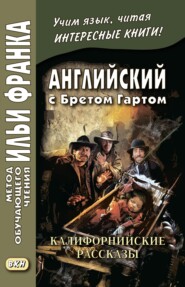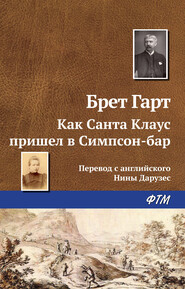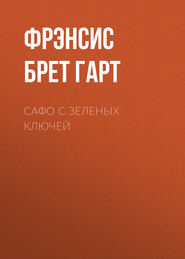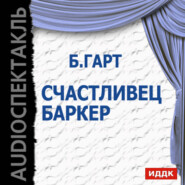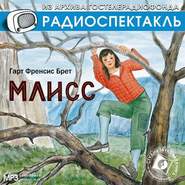По всем вопросам обращайтесь на: info@litportal.ru
(©) 2003-2024.
✖
Gabriel Conroy
Автор
Год написания книги
2017
Настройки чтения
Размер шрифта
Высота строк
Поля
"Then you think it is a genuine grant?" she said, with a slight sigh.
"As genuine as any that receive a patent at Washington," he replied, promptly.
"Ah!" said Donna Dolores, simply. The feminine interjection appeared to put a construction upon Señor Perkins' reply that both annoyed and challenged him. He assumed the defensive.
"Have you any reason to doubt the genuineness of this particular document?"
"Yes. It was only recently discovered among Don José's papers, and there is another in existence."
Señor Perkins again reached out his hand, took the paper, examined it attentively, held it to the light and then laid it down. "It is all right," he said. "Where is the other?"
"I have it not," said Donna Dolores.
Señor Perkins shrugged his shoulders respectfully as to Donna Dolores, but scornfully of an unbusiness-like sex. "How did you expect me to institute a comparison?"
"There is no comparison necessary if that document is genuine," said the Donna, quickly.
Señor Perkins was embarrassed for a moment. "I mean there might be some mistake. Under what circumstances is it held – who holds it? To whom was it given?"
"That is a part of my story. It was given five years ago to a Dr. Devarges – I beg your pardon, did you speak?"
Señor Perkins had not spoken, but was staring with grim intensity at Donna Dolores. "You – said – Dr. Devarges," he repeated, slowly.
"Yes. Did you know him?" It was Donna Dolores' turn to be embarrassed. She bit her lip and slightly contracted her eyebrows. For a moment they both stood on the defensive.
"I have heard the name before," Mr. Perkins said at last, with a forced laugh.
"Yes, it is the name of a distinguished savant," said Donna Dolores, composedly. "Well —he is dead. But he gave this grant to a young girl named – named" – Dolores paused as if to recall the name – "named Grace Conroy."
She stopped and raised her eyes quickly to her companion, but his face was unmoved, and his momentary excitement seemed to have passed. He nodded his head for her to proceed.
"Named Grace Conroy," repeated Donna Dolores, more rapidly, and with freer breath. "After the lapse of five years a woman – an impostor – appears to claim the grant under the name of Grace Conroy. But perhaps finding difficulty in carrying out her infamous scheme, by some wicked, wicked art, she gains the affections of the brother of this Grace, and marries him as the next surviving heir." And Donna Dolores paused, a little out of breath, with a glow under her burnished cheek and a slight metallic quality in her voice. It was perhaps no more than the natural indignation of a quickly sympathising nature, but Mr. Perkins did not seem to notice it. In fact, within the last few seconds his whole manner had become absent and preoccupied; the stare which he had fixed a moment before on Donna Dolores was now turned to the wall, and his old face, under its juvenile mask, looked still older.
"Certainly, certainly," he said at last, recalling himself with an effort. "But all this only goes to prove that the grant may be as fraudulent as the owner. Then, you have nothing really to make you suspicious of your own claim but the fact of its recent discovery? Well, that I don't think need trouble you. Remember your grant was given when lands were not valuable, and your late father might have overlooked it as unimportant." He rose with a slight suggestion in his manner that the interview had closed. He appeared anxious to withdraw, and not entirely free from the same painful pre-absorption that he had lately shown. With a slight shade of disappointment in her face Donna Dolores also rose.
In another moment he would have been gone, and the lives of these two people thus brought into natural yet mysterious contact have flowed on unchanged in each monotonous current. But as he reached the door he turned to ask a trivial question. On that question trembled the future of both.
"This real Grace Conroy then I suppose has disappeared. And this – Doctor – Devarges" – he hesitated at the name as something equally fictitious – "you say is dead. How then did this impostor gain the knowledge necessary to set up the claim? Who is she?"
"Oh, she is – that is – she married Gabriel Conroy under the name of the widow of Dr. Devarges. Pardon me! I did not hear what you said. Holy Virgin! What is the matter? You are ill. Let me call Sanchez! Sit here!"
He dropped into a chair, but only for an instant. As she turned to call assistance he rose and caught her by the arm.
"I am better," he said. "It is nothing – I am often taken in this way. Don't look at me. Don't call anybody except to get me a glass of water – there, that will do."
He took the glass she brought him, and instead of drinking it threw back his head and poured it slowly over his forehead and face as he leaned backward in the chair. Then he drew out a large silk handkerchief and wiped his face and hair until they were dry. Then he sat up and faced her. The chalk and paint was off his face, his high stock had become unbuckled, he had unbuttoned his coat and it hung loosely over his gaunt figure; his hair, although still dripping, seemed to have become suddenly bristling and bushy over his red face. But he was perfectly self-possessed, and his voice had completely lost its previous embarrassment.
"Rush of blood to the head," he said, quietly; "felt it coming on all the morning. Gone now. Nothing like cold water and sitting posture. Hope I didn't spoil your carpet. And now to come back to your business." He drew up his chair, without the least trace of his former diffidence, beside Donna Dolores, "Let's take another look at your grant." He took it up, drew a small magnifying glass from his pocket and examined the signature. "Yes, yes! signature all right. Seal of the Custom House. Paper all regular." He rustled it in his fingers, "You're all right – the swindle is with Madame Devarges. There's the forgery – there's this spurious grant."
"I think not," said Donna Dolores, quietly.
"Why?"
"Suppose the grant is exactly like this in everything, paper, signature, seal and all."
"That proves nothing," said Mr. Perkins, quickly. "Look you. When this grant was drawn – in the early days – there were numbers of these grants lying in the Custom House like waste paper, drawn and signed by the Governor, in blank, only wanting filling in by a clerk to make them a valid document. She! – this impostor – this Madame Devarges, has had access to these blanks, as many have since the American Conquest, and that grant is the result. But she is not wise, no! I know the handwriting of the several copyists and clerks – I was one myself. Put me on the stand, Donna Dolores – put me on the stand, and I'll confront her as I have the others."
"You forget," said Donna Dolores, coldly, "that I have no desire to legally test this document. And if Spanish grants are so easily made, why might not this one of mine be a fabrication? You say you know the handwriting of the copyists – look at this."
Mr. Perkins seized the grant impatiently, and ran his eye quickly over the interlineations between the printed portions. "Strange!" he muttered. "This is not my own nor Sanchez; nor Ruiz; it is a new hand. Ah! what have we here – a correction in the date – in still another hand? And this – surely I have seen something like it in the office. But where?" He stopped, ran his fingers through his hair, but after an effort at recollection abandoned the attempt. "But why?" he said, abruptly, "why should this be forged?"
"Suppose that the other were genuine, and suppose that this woman got possession of it in some wicked way. Suppose that some one, knowing of this, endeavoured by this clever forgery to put difficulties in her way without exposing her."
"But who would do that?"
"Perhaps the brother – her husband! Perhaps some one," continued Donna Dolores, embarrassedly, with the colour struggling through her copper cheek, "some – one – who – did – not – believe that the real Grace Conroy was dead or missing!"
"Suppose the devil! – I beg your pardon. But people don't forge documents in the interests of humanity and justice. And why should it be given to you?"
"I am known to be a rich woman," said Donna Dolores. "I believe," she added, dropping her eyes with a certain proud diffidence that troubled even the preoccupied man before her, "I – believe – that is I am told – that I have a reputation for being liberal, and – and just."
Mr. Perkins looked it her for a moment with undisguised admiration. "But suppose," he said, with a bitterness that seemed to grow out of that very contemplation, "suppose this woman, this adventuress, this impostor, were a creature that made any such theory impossible. Suppose she were one who could poison the very life and soul of any man – to say nothing of the man who was legally bound to her; suppose she were a devil who could deceive the mind and heart, who could make the very man she was betraying most believe her guiltless and sinned against; suppose she were capable of not even the weakness of passion; but that all her acts were shrewd, selfish, pre-calculated even to a smile or a tear – do you think such a woman – whom, thank God! such as you cannot even imagine – do you suppose such a woman would not have guarded against even this? No! no!"
"Unless," said Donna Dolores, leaning against the secretary with the glow gone from her dark face and a strange expression trembling over her mouth, "unless it were the revenge of some rival."
Her companion started. "Good! It is so," he muttered to himself. "I would have done it. I could have done it! You are right, Donna Dolores." He walked to the window and then came hurriedly back, buttoning his coat as he did so, and rebuckling his stock. "Some one is coming! Leave this matter with me. I will satisfy you and myself concerning this affair. Will you trust this paper with me?" Donna Dolores without a word placed it in his hand. "Thank you," he said, with a slight return of his former embarrassment, that seemed to belong to his ridiculous stock and his buttoned coat rather than any physical or moral quality. "Don't believe me entirely disinterested either," he added, with a strange smile. "Adios."
She would have asked another question, but at that instant the clatter of hoofs and sound of voices arose from the courtyard, and with a hurried bow he was gone. The door opened again almost instantly to the bright laughing face and coquettish figure of Mrs. Sepulvida.
"Well!" said that little lady, as soon as she recovered her breath. "For a religiously inclined young person and a notorious recluse, I must say you certainly have more masculine company than falls to the lot of the worldly. Here I ran across a couple of fellows hanging around the casa as I drove up, and come in only to find you closeted with an old exquisite. Who was it – another lawyer, dear? I declare, it's too bad. I have only one!"
"And that one is enough, eh?" smiled Donna Dolores, somewhat gravely, as she playfully tapped Mrs. Sepulvida's fair cheek with her fan.
"Oh yes!" she blushed a little coquettishly – "of course! And here I rode over, post haste, to tell you the news. But first, tell me who is that wicked, dashing-looking fellow outside the courtyard? It can't be the lawyer's clerk."
"I don't know who you mean; but it is, I suppose," said Donna Dolores, a little wearily. "But tell me the news. I am all attention."
But Mrs. Sepulvida ran to the deep embrasured window and peeped out. "It isn't the lawyer, for he is driving away in his buggy, as if he were hurrying to get out of the fog, and my gentleman still remains. Dolores!" said Mrs. Sepulvida, suddenly facing her friend with an expression of mock gravity and humour, "this won't do! Who is that cavalier?"
With a terrible feeling that she was about to meet the keen eyes of Victor, Donna Dolores drew near the window from the side where she could look out without being herself seen. Her first glance at the figure of the stranger satisfied her that her fears were unfounded; it was not Victor. Reassured, she drew the curtain more boldly. At that instant the mysterious horseman wheeled, and she met full in her own the black eyes of Mr. Jack Hamlin. Donna Dolores instantly dropped the curtain and turned to her friend.
"I don't know!"
"Truly, Dolores?"
"Truly, Maria."
"Well, I believe you. I suppose then it must be me!"







